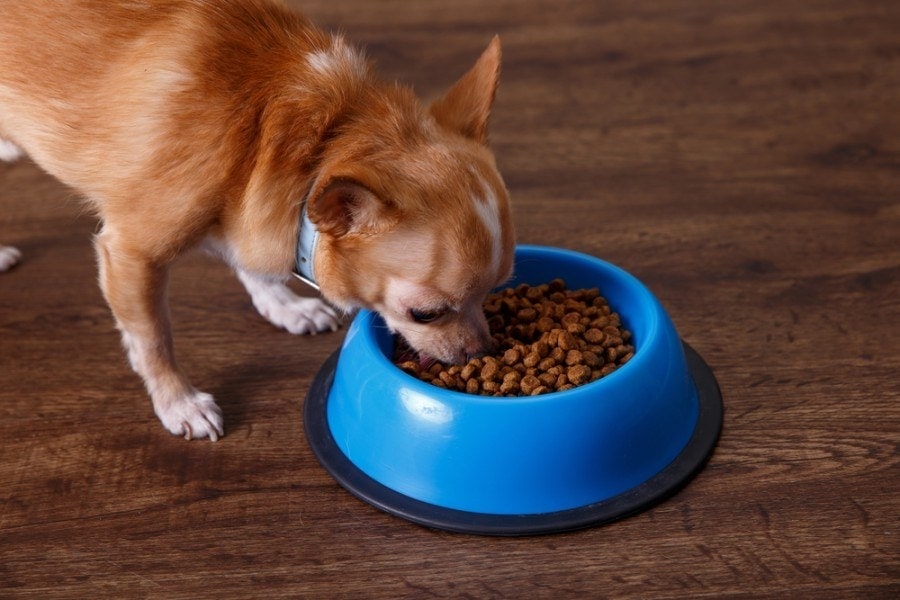Can Dogs Eat Lemons? Vet Approved Safety Facts & FAQ

Updated on

Let’s face it. Lemons probably aren’t high on your list of potential treats for your pooch. That’s a good thing, too. The short answer is no, dogs cannot eat lemons. It may even be toxic to your pet if they eat enough of it. However, dogs will be dogs, and some will eat just about anything they can find.
You’d think that the strong scent and acidity of lemons would be enough to deter them. Many animals avoid them naturally, and lemon is even an ingredient in repellants and stain eliminators. Unfortunately, it doesn’t end with an unpleasant taste for your dog.
What Makes Lemons Bad for Dogs?
The first thing you must understand is that many human foods are poisonous to dogs and other pets. After all, we’re all different. Just because you can eat it doesn’t mean your pup can. Potentially toxic foodstuffs include:
- Onions
- Leeks
- Garlic
- Grapes
- Raisins
- Chocolate
- Macadamia nuts
The stems, leaves, peels, fruit, and seeds of citrus plants contain varying amounts of citric acid. This essential oil can cause irritation and possibly even neurological signs and depression if ingested in significant amounts.1 Otherwise, the fruit can cause signs of a stomach upset, with vomiting, reduced appetite, diarrhea, and lethargy. Skin irritation is possible in some dogs.
There are two other chemicals in lemons and other citrus fruits that may be problematic for canines and other animals. The seeds, pith, and peel contain psoralen, an organic compound found in many plants. In combination with ultraviolet light (sunlight), this can potentially result in redness and irritation of the skin with blistering and dermatitis, but we have found no reports of this actually happening in dogs due to eating lemons.

The healthcare industry uses that property when treating skin conditions that respond well to light therapy, like psoriasis in people. As you may guess, it could potentially also increase the risk for some skin cancers.
The other organic compound in lemons that can adversely affect your pooch is limonene, found in the peel primarily. It is a major component of the essential oil and gives lemons their refreshing scent. Bear in mind that these ingredients are highly concentrated. A little goes a long way. All of this information adds up to a toxic food not only for dogs but cats and horses, too, while cats seem particularly sensitive. Information on toxicity in dogs is unfortunately scarce, while neurological signs such as wobbliness, weakness, tremors, drooling, coma, and even death have been noted in cats after the application of citrus oil with limonene.
Finally, eating lemon peels or rinds (although unlikely as not very tasty) can lead to a blockage in some dogs, depending on their size and the amount they may have eaten.

Is Lemonade Bad, Too?
Unfortunately, lemons are still harmful, even if they’re diluted. Remember that a thirsty dog can put away a lot of water, too. They may be likely to drink enough to trigger a reaction if they like it, but in reality, most dogs will steer clear of lemon due to its sour and tart taste. However, because it’s in liquid form, your pet’s body may absorb it quicker and probably more of it as well.
The other issue involves what’s sweetening your beverage. Sugar in large quantities isn’t something that your pooch needs in the short or long term. Artificial sweeteners like xylitol are toxic for dogs, with quite serious outcomes. If your dog has drunk lemonade, call your vet for advice. They will likely suggest you monitor your pooch for signs of an upset stomach. But if the juice contains xylitol, your dog will need to go and see a vet immediately.

Signs and Treatment
If your dog tastes a little just to know they don’t like it, they’ll probably be fine. As Paracelsus, the father of toxicology, once said, “Only the dose makes the poison.” A lot of lemons or concentrated lemon juice, therefore, would be harmful. Signs you may see in your pup include:
- Diarrhea
- Vomiting
- Drooling
- Reduced appetite
- Irritation around and inside of his mouth
- Lethargy
- Sensitivity to light (rare)
- Dermatitis and skin irritation (rare)
Depending on the pet and their physiology, ingestion of a significant amount of concentrated citric acid may potentially lead to neurological signs, but this seems rare in dogs, as luckily they dislike the taste. If you suspect your dog has eaten lemons, contact your veterinarian for advice.
Your vet will treat your pooch symptomatically, trying to make them feel better, depending on the signs they are exhibiting.
Final Thoughts
If you have a food-motivated dog, it’s imperative to learn what foods are toxic to your pet. Please don’t assume that they can eat anything that you can, including lemons. Citrus fruits contain organic compounds that may be poisonous to your pup if ingested in large amounts. We suggest playing it safe. Only give your canine friend foods and treats formulated for dogs. They’ll be a lot happier and healthier in the long run.
- Related Read: Can Dogs Drink Lemonade? Is Lemonade Safe for Dogs?
Featured Image Credit: stevepb, Pixabay












